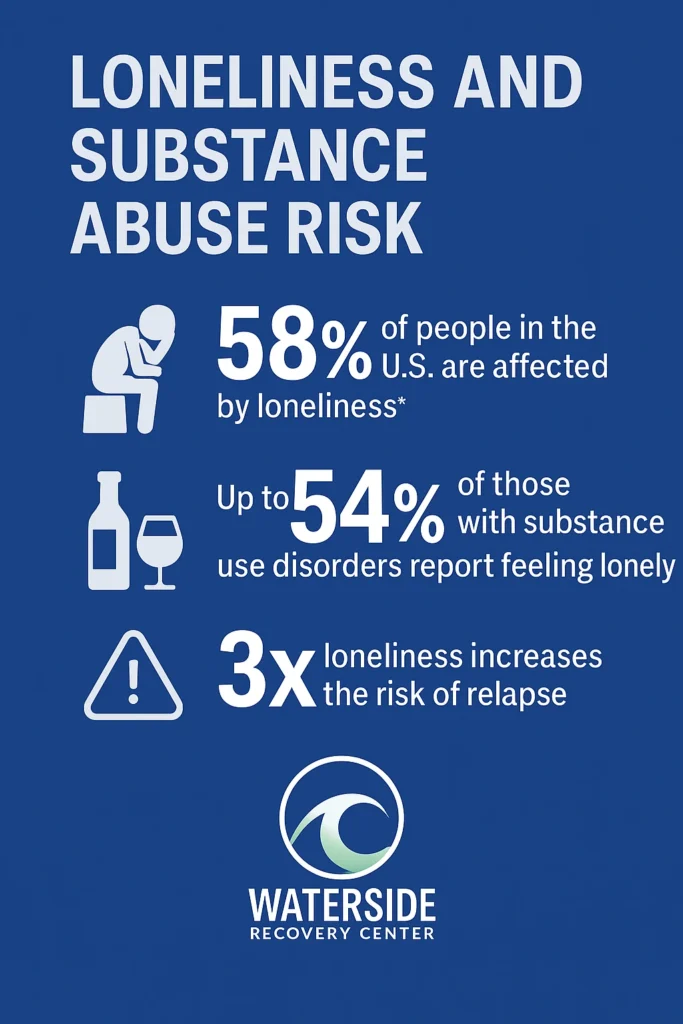Early sobriety can feel like being the last person left in the room.
No more drinking buddies. No more texts that start with “Wanna grab one?” Just the quiet. The ache. The unfamiliar feeling of being fully awake—and fully alone.
You might’ve thought quitting alcohol would fix everything. Instead, it left you sitting with everything you drank to avoid.
If that’s where you are right now, take a breath. You are not broken. You are in early recovery. And at Waterside Recovery, our alcohol addiction treatment in Plymouth County, MA is designed to help you reconnect—with others, with yourself, and with the kind of life that doesn’t need numbing.
Why Is Connection So Important in Alcohol Addiction Treatment?
Because addiction isolates you—and connection brings you back to life.
Alcohol addiction doesn’t just damage your body. It hijacks your ability to relate. It convinces you that you’re a burden, that nobody understands, that you’re safer alone. Over time, isolation becomes not just a side effect, but part of the addiction itself.
That’s why real recovery requires more than abstinence. It requires relationship.
At Waterside, we believe healing happens in safe, honest, human connection. Whether that starts with a group therapy breakthrough or simply being able to say “I’m not okay” without being judged—we’re here for it.
“I’m Not Used to Trusting People Anymore.”
Most of us aren’t—at first.
Maybe you’ve been burned. Maybe you did the burning. Either way, trust isn’t something we expect you to hand over on day one. It’s something we help you rebuild, piece by piece.
You’ll meet people who’ve sat in your exact seat. You’ll hear stories that mirror your own. You’ll learn how to listen and be heard without fear.
And one day, maybe sooner than you think, you’ll realize you’re not just staying sober—you’re connecting.
Can You Really Make Friends in Recovery?
Yes. And they might be the most honest, hilarious, life-saving friends you’ve ever had.
People in recovery cut through the surface stuff fast. There’s no pretending everything’s fine when you’re crying in group or white-knuckling through a craving. That kind of honesty breeds something rare: connection without performance.
You won’t click with everyone. But you’ll find your people. The ones who show up. Who laugh at the dark stuff. Who see your strength even on your worst day.
It’s not high school. It’s real life, finally starting to feel real again.
What If I’m Still Grieving My Old Life?
You’re allowed to grieve. It means you’re alive.
Early recovery often feels like emotional whiplash. One day you’re proud. The next, you miss the chaos. You mourn the rituals—Friday drinks, weekend barbecues, the false freedom alcohol gave you.
Grief in recovery is valid. But connection is what helps you process it without going backward.
It’s in community that we say: “Yeah, I miss it sometimes too. But here’s what I’ve found instead.”

How Does Waterside Help Rebuild Connection?
We don’t force it. We facilitate it—with safety, structure, and compassion.
Some people walk in ready to pour their hearts out. Others sit with arms crossed for two weeks. Both are welcome. Our alcohol addiction treatment program creates space for connection in ways that feel real—not forced.
This includes:
- Group therapy that goes beyond surface talk
- Peer support from people who’ve been where you are
- Family therapy to start rebuilding strained relationships
- Alumni community that stays connected post-treatment
You don’t need to be extroverted. You just need to stay open—even a crack.
What If I Feel Like I Don’t Deserve Connection?
Let’s be real—shame is brutal in early recovery.
It whispers, They’d hate me if they knew who I really am.
But here’s the truth: You are not your worst mistake. And connection isn’t something you earn by being perfect. It’s something you heal through.
No one gets sober alone. And no one has to prove they’re worthy of being seen.
Real Words from Real People
“I thought I was just here to stop drinking. But I started laughing again. That felt bigger than sobriety.”
– Outpatient Client, 2023
“Group therapy terrified me. Now I text those people every day.”
– Alumni, 2024
“I didn’t know how lonely I was until someone asked how I was doing—and meant it.”
– Residential Client, 2022
FAQ: Connection in Recovery & Treatment
Why does alcohol addiction make people feel so isolated?
Alcohol often becomes a coping tool for emotional pain. Over time, people pull away from others to hide their use, avoid conflict, or manage shame—leading to deep isolation.
Is connection a formal part of alcohol addiction treatment?
Yes. Most quality alcohol addiction treatment programs, like ours at Waterside, include group therapy, peer support, and family involvement to rebuild healthy relationships and community.
What if I’m introverted or socially anxious?
That’s okay. Connection doesn’t mean being the loudest in the room. It can be eye contact, a nod of understanding, a short conversation after group. We honor your pace.
Do I have to talk in groups?
You’ll never be forced to speak. But many clients find that even just hearing others share makes them feel less alone. When you’re ready, your voice will matter here.
How long does it take to feel connected in recovery?
There’s no set timeline. Some feel it within days. Others take weeks. What matters most is showing up—even when it’s awkward, even when it’s hard.
Looking for Alcohol Addiction Treatment in Plymouth County, MA?
Waterside Recovery provides trauma-informed, connection-centered care across Southeastern Massachusetts. If you’re seeking alcohol addiction treatment in Bristol County, MA or right here in Plymouth County, we’re here when you’re ready.
Want someone to talk to who gets it?
Call (866)671-8620 or visit our Alcohol Addiction Treatment page to learn more about our programs in Plymouth County, MA. You don’t have to do this alone—and you were never meant to.


